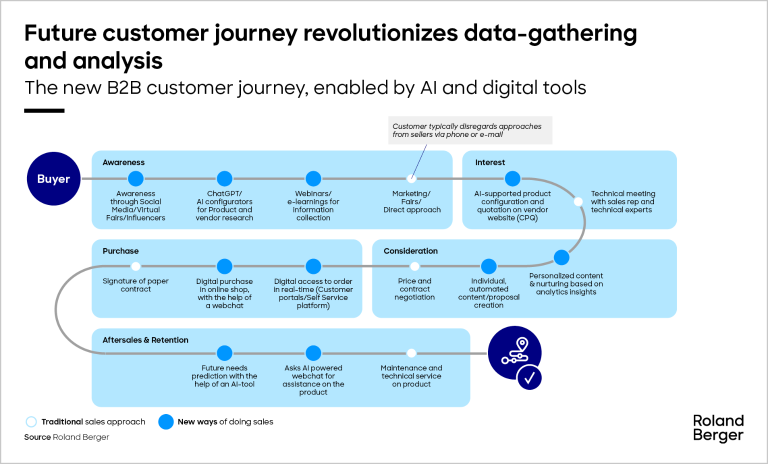In-depth analysis by Roland Berger looks at the performance of eleven key segments of the capital goods industry segments – and investigates what lies ahead for each one.


The future of selling in industrial manufacturing
Capital goods player face growing challenges with their traditional B2B sales approach
Industrial manufacturers are facing challenging times. Increasingly, their business customers are abandoning the old method of buying through sales reps and refocusing on digital channels, a trend we have already witnessed in consumer sales. The customer journey has changed accordingly – and manufacturers urgently need to adapt their approach. How can they best serve today's business customers and what new tools do they need? We suggest a robust framework that can help them master the challenge.

"The customers in industrial manufacturing are changing by becoming increasingly more digitally savvy and expecting different interactions - digital, at their fingertips, and 24/7. "
The world has changed for industrial manufacturers. In the past, they sold their products to other businesses through traditional in-person channels; today, almost three-quarters of those sales take place through digital interactions. Indeed, more than 80 percent of businesses say they prefer order and paying for products via digital commerce . Digital is rapidly becoming the standard means of interaction between manufacturers and business customers, and manufacturers need to change their approach accordingly.
Adding to the pressure on manufacturers is the fact that economic growth is down overall . Capital goods companies are seeing fewer incoming orders. Europe has been particularly hard hit, with companies in German-speaking countries seeing a drop of almost ten percent in orders in the first half of 2023 compared to 2022, with a decline of nearly 15 percent in the second quarter.
A revolutionary customer journey
The customer journey for industrial products has taken on a radically different shape. Customers' interest could initially be triggered by something they see on LinkedIn or while using ChatGPT. They also have new ways to gather data at the start of their journey, attending webinars or using an online product configurator to compare different offerings. While still only some purchases can take place online, information gathering has definitely become an online approach. Due to this, sales representative are still a big part of the process but more for consulting around the best solution and building trust in the company and its capabilities
"Intelligently connecting digital channels with personal sales interactions gives capital goods players a competitive advantage. Our research and project experiences show that companies that master this achieve increased sales and better margins. "
Naturally, a new customer journey means radical changes for vendors. They must master a landscape of increased complexity: more unstructured inquiries and leads, fewer personal touchpoints, digital configuration, longer decision cycles and digital aftersales. Vendors need new tools to support them at all stages of the customer journey, especially if they wish to stand out from their competitors. Selling capital goods in today's market requires the use of technology such as AI (artificial intelligence) and digital sales channels. Sales approaches must be data-driven and centered on customers, making full use of automation. Companies must ask themselves some tough questions: Is our lead funnel working properly? Do we follow up efficiently on leads? How can we maximize our channel coverage? The answers to these questions will shape their new approach.
The Roland Berger Future of Selling framework
At Roland Berger we have developed a selling framework to help industrial manufacturers embrace customer requirements, plan and invest ahead of time and adapt their sales and marketing approaches accordingly. The Future of Selling framework enables companies to master the increasing complexity of the sales landscape. Covering all major areas from "go-to-market strategy" to "enablers", it comes with a tried-and-tested toolbox of innovative sales and marketing tools and approaches.
To find out more about our Future of Selling framework and how it can help you rise to the challenge of B2B sales, download our recent publication dedicated to this topic here or contact us for a personal discussion.
Register now to access the full study, to learn more about how to master the increasingly complex world of B2B sales in industrial manufacturing. Furthermore, you get regular news and updates directly in your inbox.






_tile_teaser_w425x260.jpg)




